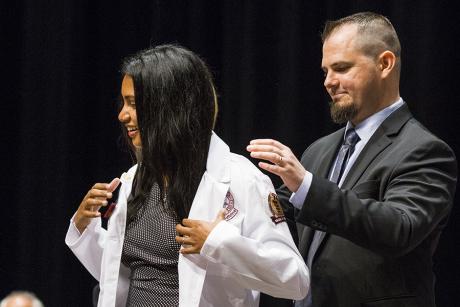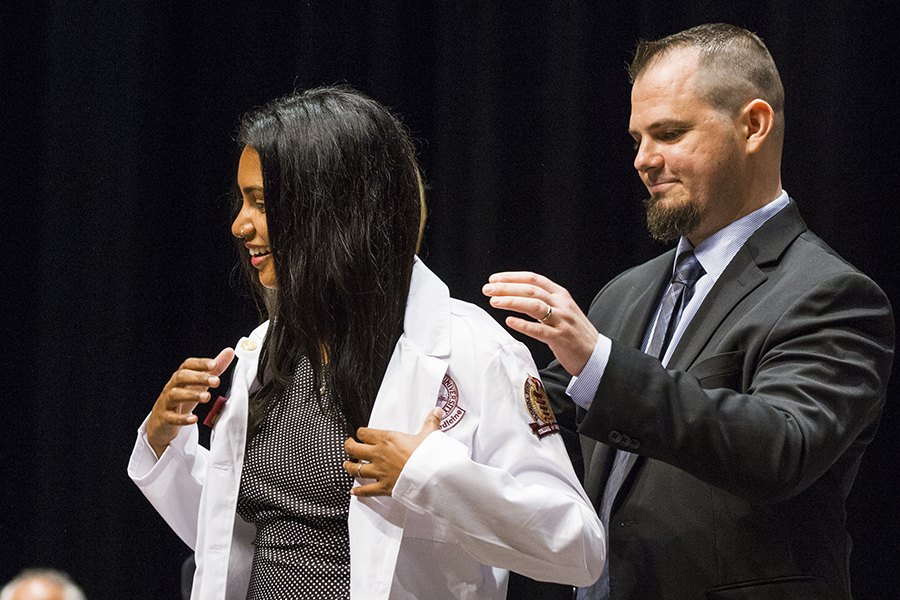A matter of life and death


More than 15 years ago, while completing graduate work in philosophy and cognitive neuroscience at CUNY Graduate Center in New York, Michael Nair-Collins, looking to make his rent, worked as an emergency room technician at a New Jersey Hospital. It changed his life.
“It kind of opened my eyes to a whole slew of ethical questions, philosophical questions and metaphysical questions that were just fascinating,” Nair-Collins said. “I saw many people die. I saw many people declared brain dead.”
Nair-Collins, a bioethicist and associate professor in the Department of Behavioral Sciences and Social Medicine, today is a prominent national voice in any conversation about brain death. He recently accepted an invitation confirming as much, joining the Uniform Law Commission Study Group to Examine the Uniform Determination of Death Act (UDDA), established in 1981.
The main purpose of the study group is to examine whether changes are needed to the UDDA.
The Uniform Law Commission provides states with non-partisan and well-drafted legislation that brings clarity and stability to critical areas of state statutory law.
Issues to be considered by the committee include lack of uniformity in the standards used to determine death by neurological criteria, the relevance of hormonal functions, and whether consent should be required before proceeding with tests to determine whether brain death has occurred, particularly what is known as "the apnea test."
“Organ transplantation is intimately embedded within the whole debate from the very beginning, the main reason being you can’t get an organ from an actual dead body and have it function in someone’s body,” Nair-Collins said. “One rule that has been claimed to have been followed is known as the ‘dead donor’ rule, which says donors have to be dead before you take out their organs. But in reality, as I argue, they’re not dead before you take out their organs.
“So, my position is not to stop organ transplantation, but to allow genuine, valid, informed consent for organ removal, because it is lethal, from a biological perspective, although the patient’s capacity for consciousness is almost certainly no longer present.”
Nair-Collins is a proponent of amending the UDDA to incorporate advances in science so as to alleviate the hornet’s nest of litigation that has arisen over the years. A notable case and bioethical debate in the last decade concerned a young girl who was declared dead, twice, in two different states, five years apart.
“Obviously you want to have the same laws,” Nair-Collins said. “You don’t want someone to be legally alive in one state and legally dead in another. Way back in the 1960s was this concept of brain death, where physicians would determine patients to be dead based on lack of neurological activity rather than on the basis of lack of heart and lung function.
“But there are a number of problems with this. One is whether brain death can actually be diagnosed reliably. The Uniform Determination of Death Act states that the individual is dead upon cessation of all functions of the entire brain. Logically, that means if there’s any function of any part of the brain that is continuing, that’s not brain dead, and if someone is declared brain dead, that’s a false positive.”
Nair-Collins thinks the UDDA needs some updating.
“My view is, yes, the act should be partially amended,” he said. “The one issue I mentioned is diagnostic uncertainty, false positives. But the other issue is that as a matter of science, as a matter of physiology, patients who are brain dead, I argue, are biologically living human beings.”
Changes to the UDDA are not exactly on the fast track. The study group will likely make recommendations by the summer of 2021, at which point a drafting committee would be formed to create text for any revisions to the act.
“These things take time,” Nair-Collins said.
Spotlight photo (home page): Nair-Collins, left, with Gary Goforth, founding director of the College of Medicine's family medicine residency program in Fort Myers, during a research fair in the atrium.
Above: Nair-Collins coated his wife, Sangeeta Nair-Collins (M.D., '18), at the White Coat Ceremony in 2015.

